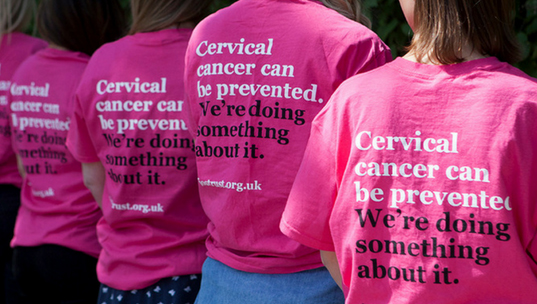Every year in the UK more than 3,000 women are diagnosed with cervical cancer.
However, despite these huge figures, it’s been claimed that one in three women don’t attend cervical screenings because of ’embarrassment’. This is staggering when two women in the UK lose their lives every day. Now we’re highlighting the importance of attending regular screenings.
Around three quarters of cervical cancer cases could be prevented by screening, so it’s hugely important everyone has them on a regular basis.
“This week is a great opportunity to reach as many people as possible and explain how they can reduce their risk of diseases,” says our Nursing Services Lead, Kath Savage. “Knowing what symptoms are can help you know what to look for, so you will know when to seek medical advice. But even if you don’t have any symptoms, make sure you book your smear test as soon as possible, and know how to access support and information.”
Here we look at some of the signs, symptoms and importance of screenings…
What is cervical cancer?
Cervical cancer forms in the cells that line the cervix – the lower, narrow part of the womb. In its early stages, cervical cancer may not present with any symptoms. However, it can be prevented through regular screenings, more commonly known as smear tests.
It is not thought to be hereditary, with 99.7% of cervical cancer cases caused by persistent infections with a virus called high risk human papillomavirus.
What are the symptoms?
The symptoms of cervical cancer include
- lower back pain
- pain during sex
- bleeding during sex or between periods
- post-menopausal bleeding
- unusual vaginal discharge
If you have any of these symptoms you should see your GP immediately. Even without symptoms, you should still book your smear test as soon as possible
What is a cervical smear test and when will you get invited?
For many people, the fear or uncertainty of what happens during a smear test is enough of a factor not to go – but don’t let it stop you.
A smear test is free and available on the NHS. It helps prevent cervical cancer by checking for the high risk human papillomavirus (HPV) virus and cervical changes.
You should get an invite if you have a cervix. In the UK and Scotland, you are automatically invited if you are:
- between the ages of 25-64
- registered with a GP as a female
- In Scotland – if you have results which show changes or need follow up – you will get an invite up to the age of 70
- In Wales you will get an invite every 3 years between ages of 25-49 and every 5 years aged between 50-64
You will be invited every year, every 3 years or every 5 years dependant on your cervical screening result.
If you do discover you have cervical cancer, or any other type of cancer for that matter, know that The Fire Fighters Charity is here to help you come to terms with this.
“A cancer diagnosis can be very frightening and is often life-changing,” says our Welfare Services Lead Carrie Pearce. “We can provide practical support and guidance to help you adjust. Many people find having a plan in place to help you and your family through difficult times can be useful and really helps with understanding your wishes for the future.”
Whether you are a member of the fire service or the dependant of one, we may be able to help you with your mental, physical and social wellbeing, depending on where you are with regards to your diagnosis and treatment.
For further information about accessing our services, call our Support Line: 0800 3898820.
Try our bitesize and full online courses
We have a great range of shorter bitesize and up to six-week online courses available, with topics on managing stress to debt management, gambling, learning to change and more.
Updated: June 2023
First published: January 2019


